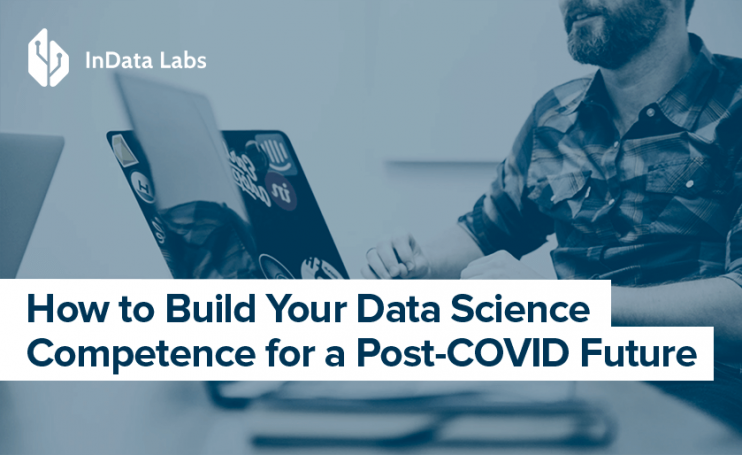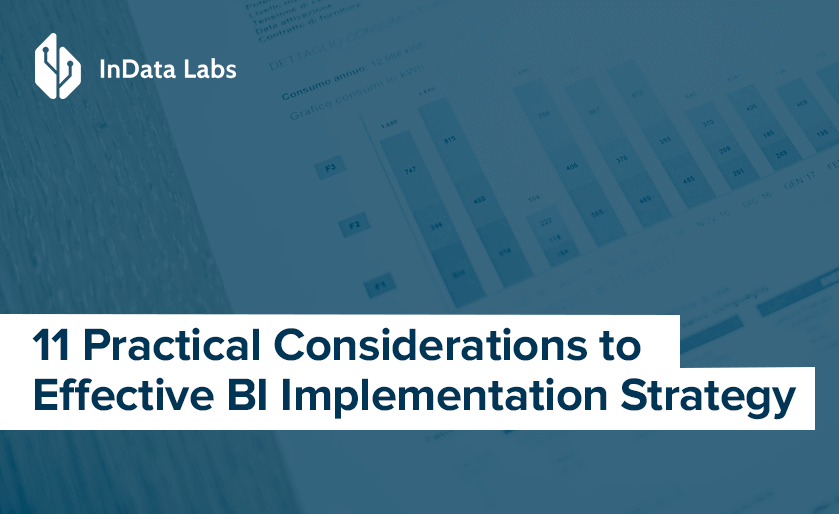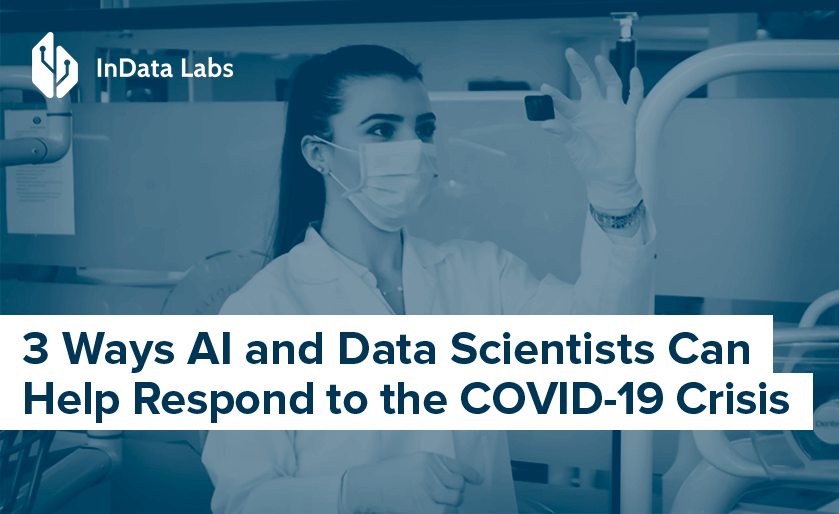Does your company need data scientists?
Absolutely.
Your competitors are looking for data science solutions right now, hoping to get a competitive advantage. The future of data science seems promising and challenging. Even nowadays, data scientists can help to improve marketing, recruiting, cybersecurity, customer service, and other critical goals. So, the time to begin is now.
That’s why both startups and huge corporations look for data science consulting. They need urgent help in making sense of enormous customer data sets they have, and somebody has to offer it.
This post is here for business owners who would like to know what data science can do for your company, too. In this article, we list four practical ways to build business intelligence with data science in your organization.
1. Use Predictive Modeling to Sell more with Product Recommendations
Product recommendation engines are predictive modeling-based filtering systems. They propose similar products on eCommerce websites. They are very popular these days and have helped many businesses increase their profits.
They’re data filtering systems that use machine learning algorithms to suggest the most relevant items for specific users.
For example, Amazon generates 35 percent of its revenues with the product recommendation system. It analyzes data from each customer’s purchases, preferences, viewed product pages, and creates a list of personalized products. All of this, thanks to data science and machine learning.

Curious to know how the data science behind Amazon’s recommendation engine?
It uses the so-called item-to-item collaborative filtering method. Its goal is to provide high-quality product recommendations by matching purchased items with similar items.
Many eCommerce businesses, especially large ones, invest in their own product recommendation engines based on predictive modeling. If set up properly, they can significantly increase revenues and improve the customer shopping experience.
So, does data science have a future in eCommerce? Definitely, yes.
Related: Big Data Behind Recommender Systems
2. Protect Against Fraud with Machine Learning
Businesses in the financial industry have digitized their operations. But the methods of protecting data and detecting fraudulent activities remain outdated. For example, the rule-based protection processes can only detect obvious fraud and require too much manual work.
That’s why businesses are looking for data scientists for help, and for a good reason. There’s an artificial intelligence (AI) method to identify rare events – potential security issues – called “financial anomaly detection.” It’s powered by machine learning and analyzes financial data to find these events.
Basically, this method uses an algorithm to identify any changes or anomalies. Microsoft’s algorithm, for example, is using this path to auto-approve hundreds of royalty statements every week.
Any anomalies detected during processing cause the software to decline the transaction automatically.
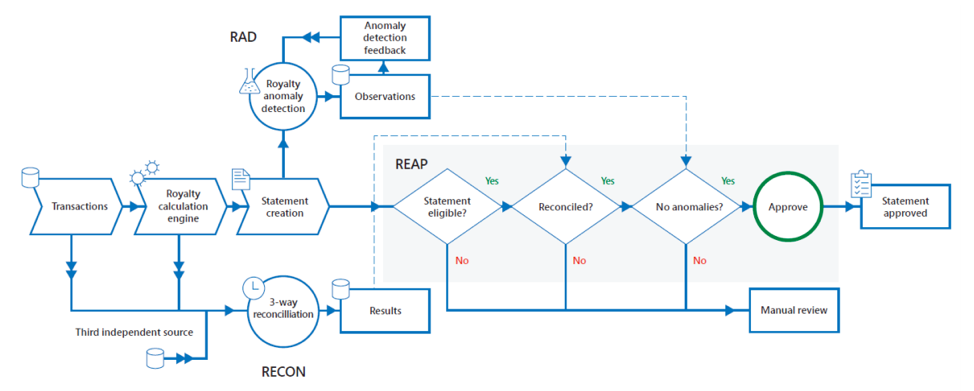
Source: Microsoft
As you can see, there are numerous steps involved in the path, which minimizes the chance of a fraudulent event to slip by. Regular reporting made with descriptive statistics and other methods keeps data scientists updated on the financial security of the company.
Using such software helps companies save tons of time while doing more business. Obviously, data scientists play an important role in making this happen. They’re responsible for interpreting the results generated by the software and help improve it.
Anomaly detection software is also applicable in many other scenarios. Managing advertising and content marketing budgets is one of them: the algorithm can show you best-performing ads and content and the areas where you’re losing money.
3. Use AI-Enabled HR Apps to Manage Employees and Find Better Candidates
Does data science have a future in HR?
Absolutely.
Recently, we’ve seen a lot of impressive AI-powered apps for recruiting. With businesses struggling to find top talent, the demand for these solutions keeps increasing.
Here are the most promising apps and features you could work on:
- Employee onboarding chatbots. A chatbot is an AI-powered application that can answer a candidate’s or employee’s questions about the company. Since this helps with reducing time to hire and improving employee onboarding, many companies will be looking for solutions like this.
- Conversational AI recruiting platforms. Employers use these to analyze recruitment processes such as screening and sourcing. For example, an HR specialist can use conversational AI (which also uses Natural Language Processing) to analyze conversations with candidates, create their detailed profiles and shortlist applicants.
- Job description analysis tools. Data science is the future of more engaging job ads. There are already apps that use NLP and predictive analytics to analyze job descriptions and eliminate mistakes like gendered and biased language.
To get a competitive edge by attracting top talent, companies of all sizes will be investing in AI recruiting tools.
In fact, reports say that the global AI recruitment market is supposed to grow at an annual rate of 7.6 percent by 2027. This huge increase is mostly driven by the effectiveness of predictive analytics to automate recruiting processes and find better candidates.
4. Use AI to Enhance Cybersecurity
Cybersecurity is always an issue for companies. With global cybercrime losses costing trillions every year, finding effective security solutions to protect data is a priority for many.
Cybercriminals have gotten excellent at stealing valuable data with targeted attacks and other methods. In many cases, they succeed, as many digital products have security flaws.
For example, this research found that most apps of U.S. banks have major security issues that put user data at significant risk. This unnamed app’s analysis from that research shows some of these issues.
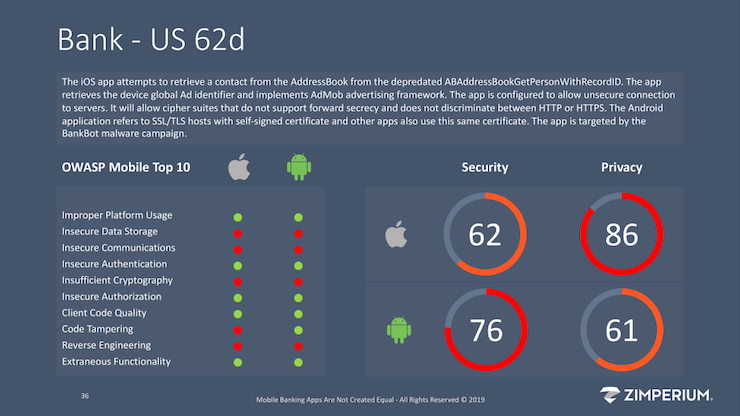
Source: TechCrunch
That’s why data science future trends suggest that cybersecurity will be a major area for investment.
If you use AI tools and applications in cybersecurity, you can prevent data loss and reputation damage. The future scope of data science applications in this field is enormous, considering numerous issues to tackle.
Here are some data science and machine learning methods used in cybersecurity solutions:
- Classification. eCommerce businesses use data science models that identify fraudulent operations (credit card fraud, internet fraud, etc.) by classifying them as problems based on pre-defined characteristics
- Regression. A machine learning model can use some existing data to make predictions about the future. This result will be useful to determine the probability of fraud; for example, the model can determine suspicious users based on the history of existing ones
- Clustering. Often called unsupervised learning, clustering is an effective strategy for identifying anomalies in user behavior and malware analysis. For example, clustering attempts to log in into different groups based on similar data points, you can find if login credentials have been stolen.
The list doesn’t end there, of course. Data science is currently widely accepted as a great tool for data protection because it powers more effective machine learning algorithms.
So, the vision of the future of data science and machine learning in cybersecurity is definitely working together to protect valuable data from hackers.
What to Look For in Data Scientists?
If you decide to hire a data science company, you need to ensure it has what it takes to make your projects work. Here’s the expertise it should have.
- Specific niche expertise: MongoDB, R, business intelligence tools, ML, NLP, Computer Vision, Spark, etc. Basically, these are tools and processes that aren’t the basic ones (Python and SQL).
- Own R&D center. This is a must for helping you find the solution for your unique challenge. A lack of an R&D means you’ll probably be offered a one-size-fits-all solution.
- Custom AI app development. A data science company should have sufficient resources to provide custom AI algorithms and models to tackle industry-unique business problems.
These soft skills are also a major consideration:
- Effective communication. Needed to explain findings and insights to you as a client during presentations and reporting.
- Critical thinking. Data scientists need to dive deeper than surface results to uncover hidden patterns.
Business sense. A data scientist working for a for-profit company has to understand the unique needs and issues of the organization and industry. - Teamwork. Data scientists work in a team with marketers, programmers, analysts, and many other stakeholders.
Try to find a data science company that possesses this knowledge and capabilities. If you do, then you can be more confident that the solution it creates will give you a good chance to gain an advantage.
Over to You
So, here you go, that’s how you can use data science in the future of your company. Thankfully, data science technologies cover a lot of business-related areas, so you will probably find a solution tailored to your unique problem.
Whatever you decide, keep in mind that custom data science products are also available to solve your business challenges.
AUTHOR BIO
Estelle Liotard is a content writer with a deep knowledge of her craft. She can take a complex topic and turn into a super easy read, be it a dissertation essay help or a blog article. When not writing content, consulting someone on her content strategy, or participating in a webinar, she’s likely traveling or jogging.
Start your Breakthrough Project with InData Labs
Have a project in mind but need some help implementing it? Drop us a line at info@indatalabs.com, we’d love to discuss how we can work with you.
